2020年中考英语一轮教材复习课件:8年级下册units9-10
文档属性
| 名称 | 2020年中考英语一轮教材复习课件:8年级下册units9-10 |

|
|
| 格式 | zip | ||
| 文件大小 | 1.8MB | ||
| 资源类型 | 试卷 | ||
| 版本资源 | 人教新目标(Go for it)版 | ||
| 科目 | 英语 | ||
| 更新时间 | 2020-02-21 00:00:00 | ||
图片预览


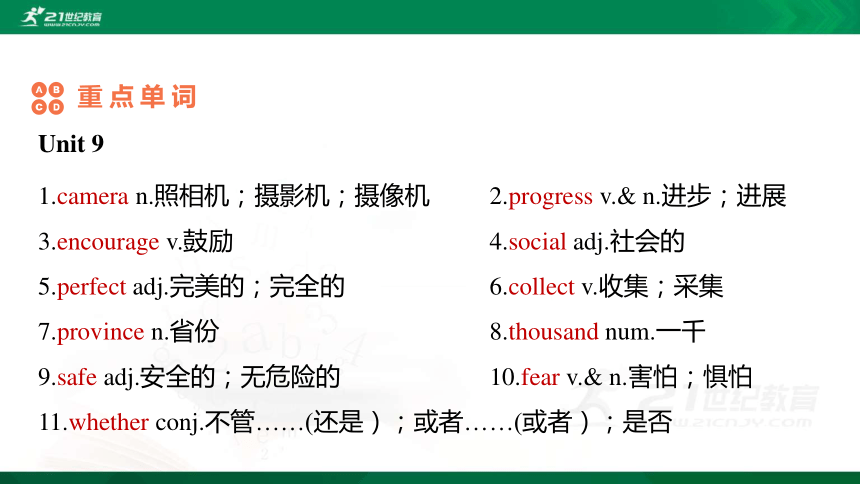
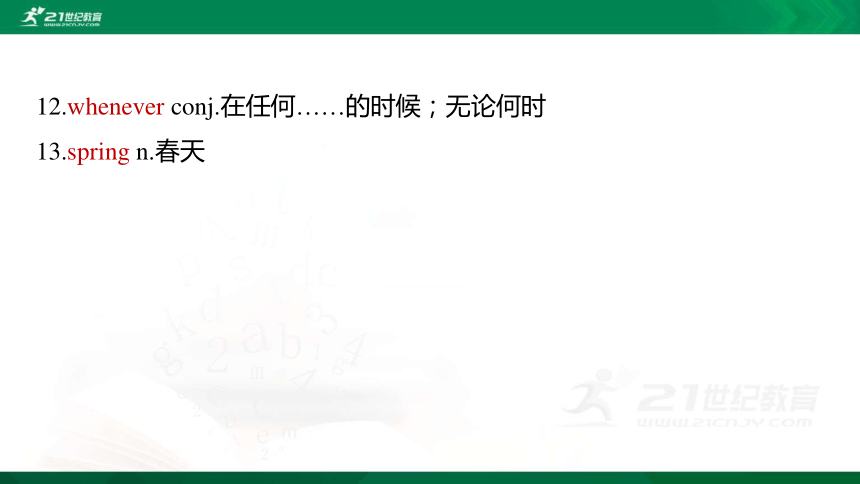
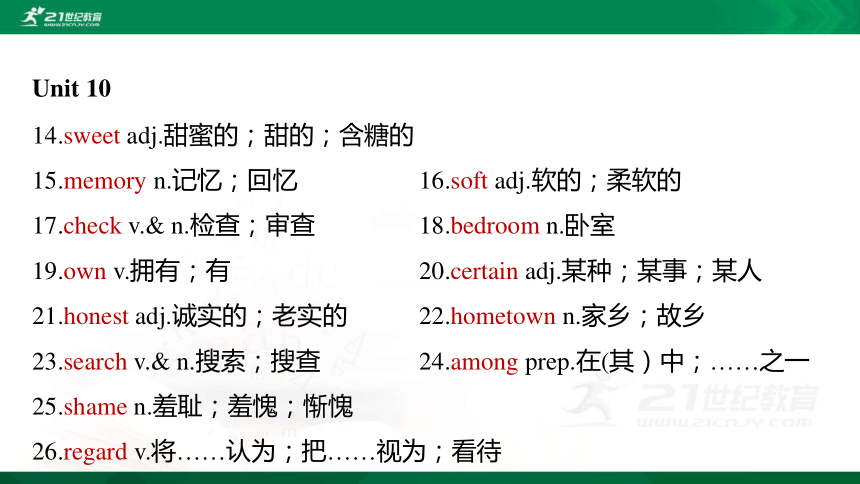
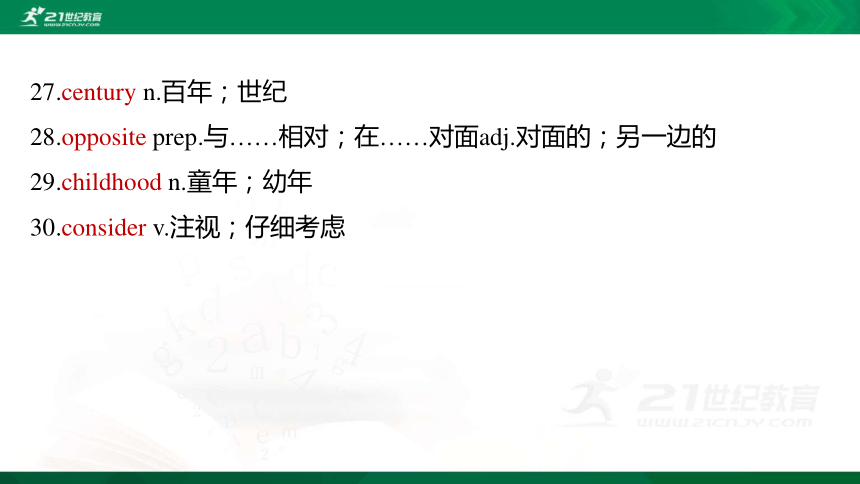
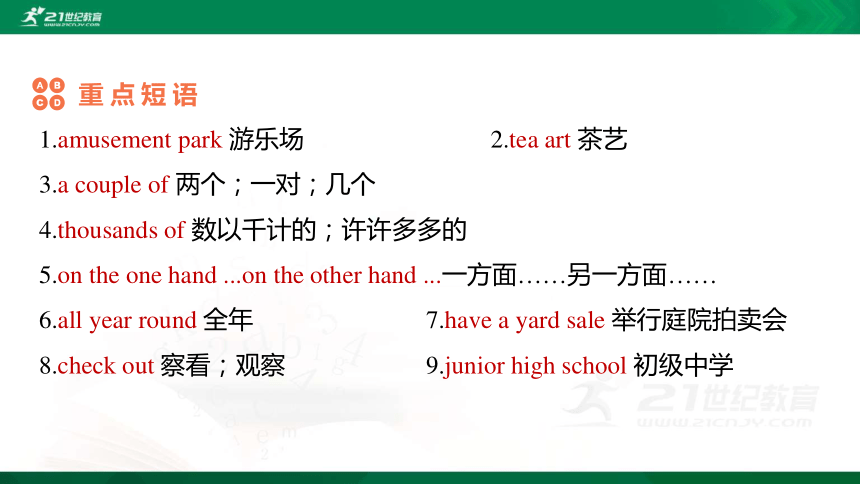

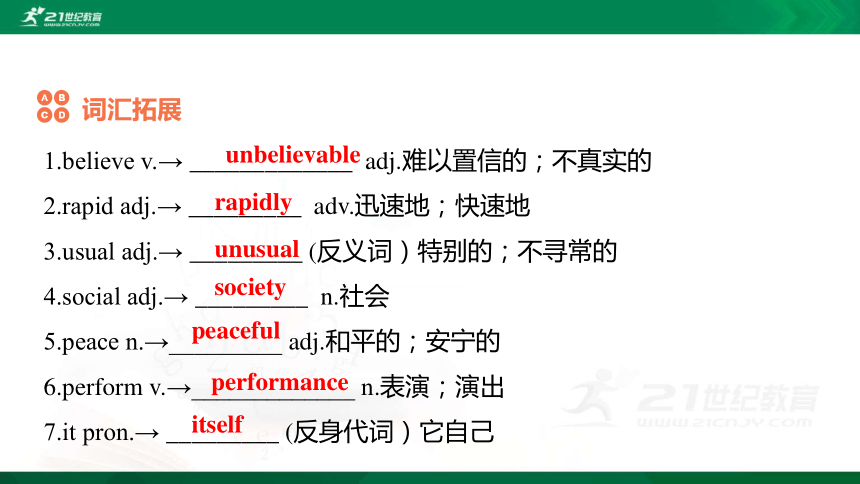
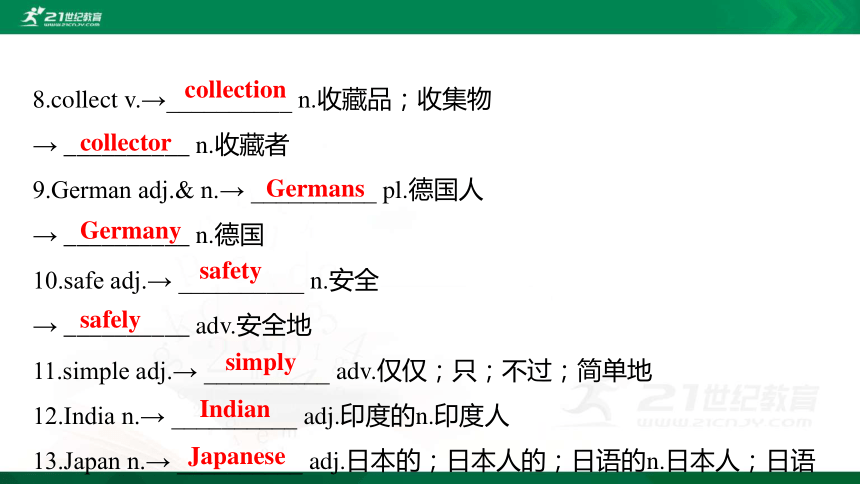
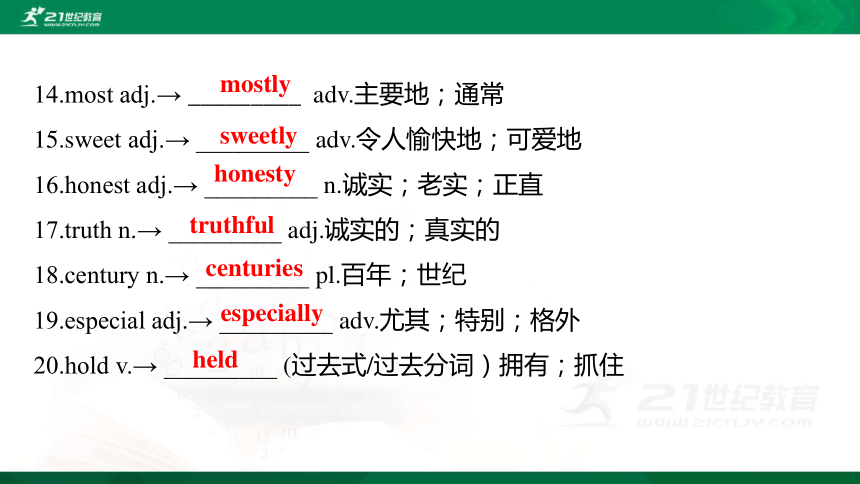
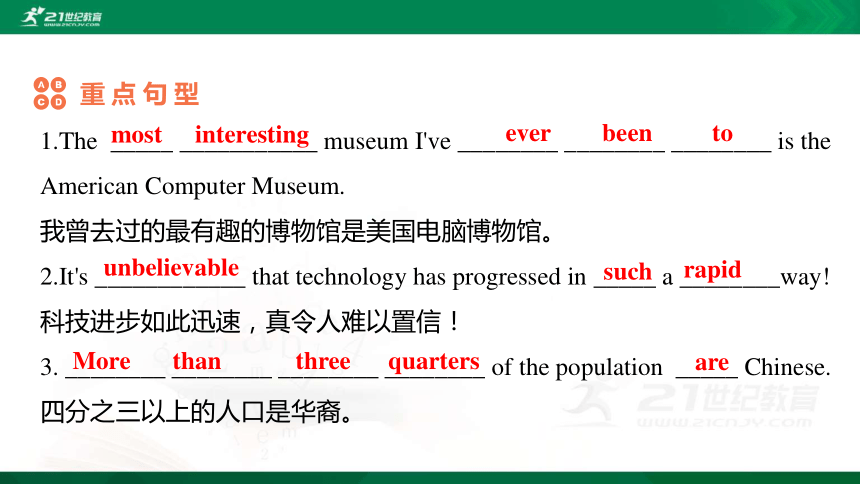
文档简介
(共76张PPT)
八年级下册Units 9—10
核心知识盘点
重 点 单 词
Unit 9
1.camera n.照相机;摄影机;摄像机 2.progress v.& n.进步;进展
3.encourage v.鼓励 4.social adj.社会的
5.perfect adj.完美的;完全的 6.collect v.收集;采集
7.province n.省份 8.thousand num.一千
9.safe adj.安全的;无危险的 10.fear v.& n.害怕;惧怕
11.whether conj.不管……(还是);或者……(或者);是否
12.whenever conj.在任何……的时候;无论何时
13.spring n.春天
Unit 10
14.sweet adj.甜蜜的;甜的;含糖的
15.memory n.记忆;回忆 16.soft adj.软的;柔软的
17.check v.& n.检查;审查 18.bedroom n.卧室
19.own v.拥有;有 20.certain adj.某种;某事;某人
21.honest adj.诚实的;老实的 22.hometown n.家乡;故乡
23.search v.& n.搜索;搜查 24.among prep.在(其)中;……之一
25.shame n.羞耻;羞愧;惭愧
26.regard v.将……认为;把……视为;看待
27.century n.百年;世纪
28.opposite prep.与……相对;在……对面adj.对面的;另一边的
29.childhood n.童年;幼年
30.consider v.注视;仔细考虑
1.amusement park 游乐场 2.tea art 茶艺
3.a couple of 两个;一对;几个
4.thousands of 数以千计的;许许多多的
5.on the one hand ...on the other hand ...一方面……另一方面……
6.all year round 全年 7.have a yard sale 举行庭院拍卖会
8.check out 察看;观察 9.junior high school 初级中学
重 点 短 语
10.clear out 清理;丢掉 11.no longer 不再;不复
12.part with 放弃、交出(尤指不舍得的东西)
13.as for 至于;关于 14.to be honest 说实在的
15.search for 搜索;搜寻 16.according to 依据;按照
17.close to 几乎;接近
1.believe v.→ _____________ adj.难以置信的;不真实的
2.rapid adj.→ _________ adv.迅速地;快速地
3.usual adj.→ _________ (反义词)特别的;不寻常的
4.social adj.→ _________ n.社会
5.peace n.→_________ adj.和平的;安宁的
6.perform v.→_____________ n.表演;演出
7.it pron.→ _________ (反身代词)它自己
词汇拓展
unbelievable
rapidly
unusual
society
peaceful
performance
itself
8.collect v.→__________ n.收藏品;收集物
→ __________ n.收藏者
9.German adj.& n.→ __________ pl.德国人
→ __________ n.德国
10.safe adj.→ __________ n.安全
→ __________ adv.安全地
11.simple adj.→ __________ adv.仅仅;只;不过;简单地
12.India n.→ __________ adj.印度的n.印度人
13.Japan n.→ __________ adj.日本的;日本人的;日语的n.日本人;日语
collection
collector
Germans
Germany
safety
safely
simply
Indian
Japanese
14.most adj.→ _________ adv.主要地;通常
15.sweet adj.→ _________ adv.令人愉快地;可爱地
16.honest adj.→ _________ n.诚实;老实;正直
17.truth n.→ _________ adj.诚实的;真实的
18.century n.→ _________ pl.百年;世纪
19.especial adj.→ _________ adv.尤其;特别;格外
20.hold v.→ _________ (过去式/过去分词)拥有;抓住
mostly
sweetly
honesty
truthful
centuries
especially
held
1.The _____ ___________ museum I've ________ ________ ________ is the American Computer Museum.
我曾去过的最有趣的博物馆是美国电脑博物馆。
2.It's ____________ that technology has progressed in _____ a ________way!
科技进步如此迅速,真令人难以置信!
3. ________ ________ ________ ________ of the population _____ Chinese.
四分之三以上的人口是华裔。
重 点 句 型
most
interesting
ever
been
to
unbelievable
such
rapid
More
than
three
quarters
are
4. _________ you like Indian food,Western food _____ Japanese food,you'll find it all in Singapore!
不管你是喜欢印度食物、西方食物还是日本食物,在新加坡你都会找到!
5.It might______ _______ ________ go to a zoo when it's dark.
天黑时去动物园可能看起来很奇怪。
6.He _____ ________ a train and railway set _____ his fourth birthday.
自从他4岁生日起,他就拥有了一套火车轨道装置。
Whether
or
has
owned
since
seem
strange
to
7.I ______ ______ return home at least once a year,but I ________ ______ ______ ______ almost three years now.
我过去至少一年回一次家,但现在我几乎三年没回过家了。
used
to
haven't
been
back
for
谈论过去的经历
1.—Have you ever been to a science museum? 你曾经去过科学博物馆吗?
—Yes,I've been to a science museum./No,I've never been to a science museum.
是的,我曾去过一个科学博物馆。/不,我从没去过科学博物馆。
2.—I've been to the art museum many times. 我去过美术博物馆许多次。
—Me,too.And I've also visited the nature museum.
我也是。我还参观过自然博物馆。
情 景 交 际
谈论所有物和周围的事物
3.—How long have you had that bike over there?
那边的那辆自行车你拥有多久了?
—I've had it for three years.
我拥有它三年了。
语 法
话 题
1.含有been,ever和never的现在完成时
2.含有since和for的现在完成时
Unit 9 有趣的地方 Unit 10 生活环境
教材考点解析
Have you ever been to a science museum?
你曾经去过科学博物馆吗?(Unit 9 P65)
【辨析】have/has been to,have/has gone to与have/has been in
考点一
I have never been to Beijing.
我从没去过北京。
—Where is Amy?
埃米在哪儿?
—She has gone to the library.
她去图书馆了。
Mr.Smith has been in Shanghai for five years.
史密斯先生在上海已经待了五年了。
图解助记
注意:当have/has been to,have/has gone to与have/has been in后跟某些地点副词(如here,there和home等)时,介词to要省略。如:
He has been there twice.
他去过那里两次了。
( )1.David knows much about the city because he ______ there many times.
A.Goes B.went C.has been
( )2.Tim with his parents ______ Thailand,and they will stay there for a week.
A.has been to B.has gone to C.have been to
C
学以致用
B
( )3.—May I speak to Mr.Lee?
—Sorry,he ______ Harbin and he ______ the city for two days.
A.has been to;has been in
B.has gone to;has been to
C.has gone to;has been in
( )4.(2019·湘西)— you ever Hong Kong-Zhuhai-Macao Bridge?
—Not yet.
A.Did;visit B.Are;visit C.Have;visited
C
学以致用
C
It also encourages governments and social groups to think about ways to improve toilets in the future.
它(指博物馆)也鼓励政府和社会团体来考虑一下未来改进厕所的方法。(Unit 9 P67)
【点拨】encourage意为“鼓励”,常用于以下结构:
考点二
( )1.Miss Smith usually encourages her students ________ English as much as possible in class.
A.Speak B.speaking C .to speak
( )2.Everyone in our class _______ to take an active part in school activities.
A.Encourages B.are encouraged C.is encouraged
C
C
学以致用
Whether you like Indian food,Western food or Japanese food,you'll find it all in Singapore!
不管你是喜欢印度食物、西方食物还是日本食物,在新加坡你都会找到!(Unit 9 P70)
【辨析】whether与if
两者都是从属连词,都能引导从句,但用法有别,具体区别如下:
考点三
单词 含义 用法 例句
whether 不管……(还是);或者……(或者) 引导让步状语从句 Whether or not we're successful,we can be sure that we did our best.
不管成功与否,我们确已尽了最大努力。
if 是否 均可引导宾语从句 I want to know whether/if he lives there.
我想知道他是否住在那儿。
如果 引导条件状语从句 If it doesn't rain tomorrow,we'll have a picnic.
如果明天不下雨,我们会去野餐。
注:含有if引导的条件状语从句的复合句的时态遵循“主将从现”原则。
【拓展】以下情况只能用whether不能用if:
(1)引导表语从句或在句首引导主语从句时。如:
The question is whether he should give up.
问题在于他是否该放弃。
Whether he comes or not doesn't concern me.
他来不来与我无关。
(2)在介词后作介词的宾语时。如:
It depends on whether he is ready or not.
这取决于他是否做好了准备。
(3)和不定式连用时。如:
I had a cold and couldn't decide whether to go to work or not.
我感冒了,拿不定主意是否要去上班。
学以致用
( )1.Your hearing will be badly hurt _______ you always listen to music by earphone.
A.Whether B.until C.if
( )2. they will go to Disneyland Park depends on the weather.
A.If B.Whether C.What
C
B
( )3.(2019·咸宁改编)—Let’s go climbing if it this Saturday.
—Good idea.But nobody knows if it .
A.is fine;rains B.is fine;will rain C.will be fine;rains
B
So you can choose to go whenever you like—spring,summer,autumn or winter.
因此你可以选择在任何时候去新加坡——春夏秋冬皆可。(Unit 9 P70)
【点拨】whenever=no matter when,意为“在任何……的时候;无论何时”,在此句中引导让步状语从句。如:
Whenever we meet with difficulties,they always come to help us.
每当我们遇到困难时,他们总来帮助我们。
考点四
【拓展】疑问代词/疑问副词+ever=no matter+疑问代词/疑问副词,其意义为“不管/无论+该疑问词的本义”。
however,whenever,wherever常用来引导让步状语从句;
whatever,whoever,whomever既可引导让步状语从句,也可引导宾语从句;
“no matter+疑问代词/疑问副词”只能引导让步状语从句,且一般位于句首。如:
Whatever you do,do it well.=No matter what you do,do it well.
无论你做什么,都要把它做好。
【归纳】
however=no matter how
whenever=no matter when
wherever=no matter where
whatever=no matter what
whoever=no matter who
whomever=no matter whom
学以致用
( )________ you go walking in the hills,you should always wear proper clothes.
A.Whatever B.Whoever C.Whenever
C
I've had this bike for three years.
我拥有这辆自行车三年了。(Unit 10 P73)
I've had them since I was a child.
从我是个孩子时起,我就拥有它们了。(Unit 10 P74)
【辨析】since与forsince与for都可以与现在完成时连用,但用法不同,具体区别如下:
考点五
单词 词性 含义 用法
since 介词 自……以来 since+过去时间点(如具体的年、月、日期、钟点等)
since+一段时间+ago
连词
since+从句(一般过去时)
for 介词 表示一段时间 for+时间段(谓语动词为延续性动词)
I have lived here since 2008.
自从2008年我就住在这儿了。
She has taught English since 10 years ago.
=She has taught English for 10 years.
她教英语十年了。
Great changes have taken place since you left.
自从你走后,发生了很大的变化。
【拓展】(1)提问“for+时间段”要用how long。如:
—How long have you been here?
你在这儿待多久了?
—I've been here for three days.
我在这儿待了三天了。
(2)与“for+时间段”连用的动词须为延续性动词,若是非延续性动词,则要转换成与之对应的延续性动词。(常见非延续性动词与延续性动词或词组的转换见P117要点提醒2)
(3)并非有“for+时间段”作状语的句子都用现在完成时。如:
I'm going away for a few days.
我要离开几天。
学以致用
( )1.(2019·菏泽)—This is a really old bike.
—Yes,I it for seven years.
A.have had B.have bought C.bought
( )2.Our reading club shares ideas with each other ________ one hour every Tuesday.
A.To B.on C.for
C
A
( )3.I'm looking after Tony today.He's been in my house ________ 8:00 this morning.
A.At B.since C.for
( )4.—Is that a new coat?
—No,I _______ it for a long time.
A.Bought B.have bought C.have had
B
C
We have decided to each sell five things that we no longer use.
我们决定每人出售五件不再使用的物品。(Unit 10 P75)
【辨析】no more,not ...any more,no longer与not ...any longer
四者都有“不再……”的意思,具体区别如下:
考点六
考点 用法 例句
no more
(=not ...any more) 常用来修饰非延续性动词,通常指今后“再也不”;表示不再重复发生以前发生的动作或存在的状态,强调终止;多用于将来时,但也可用于过去时。 I shall go there no more.=
I shall not go there any more.
我再也不去那儿了。
考点 用法 例句
no longer
(=not ...any longer) 常用来修饰延续性动词,表示与过去相比“不再……”;常用于一般现在时,但也可用在过去时和将来时的句子里,主要强调“时间不再延长”。 He no longer lives here.
=He doesn't live here any longer.他不再住在这儿了。
注意:表示时间时用no longer,常位于系动词后或实义动词前,强调数量或程度时用no more,常位于系动词后或句末。
学以致用
no more no longer any more any longer
1.He knows that he is __________young.
2.I just can't stand this life __________.
3.Don't wait __________.
4.Time or opportunity(机会) lost will return __________.
no longer
any more
any longer
no more
考点七
Among these is Zhong Wei,a 46-year-old husband and father.
钟伟,一位四十六岁的丈夫和父亲,就是其中的一位?(Unit 10 P78)
【辨析】between与among(考点讲解详见P25~P26考点8)consider (Unit 10 P79)
考点八
【点拨】consider的基本用法如下:
词义 用法 例句
考虑 consider+名词/代词/动名词 We’re considering buying a new car.
我们在考虑买一辆新车?
consider+疑问词+不定式 He was considering what to do next.
他在考虑下一步怎么办?
consider+从句 Jim is considering how he should answer the question.
吉姆在考虑应当如何回答这个问题?
词义 用法 例句
认为 consider+sb./sth.+(as+)名词/形容词 She considers herself (as) an expert on the subject.
她认为自己是这门学科的专家?
consider+sb./sth.+(to be+)名词/形容词 Do you consider him (to be) honest?
你认为他诚实吗?
consider+it+名词/形容词+不定式 We consider it hard to study English well.
我们认为学好英语很难?
consider+(that)从句 They consider (that) the hard time will soon be over.他们认为困难时期即将过去?
学以致用
( )1.—Tom,have you ever watched the talent show The Voice of China?
—Yes.Lucy,if you are good at singing,you may consider _______ a try.
A.to have B.having C.have
( )2.Our monitor ______ to be an honest boy.
A.Considers B.is considering C.is considered
B
C
语法精讲精练
现在完成时
谓语动词
形式 用法 例句
have/has+
过去分词 表示过去发生或完成的某一动作对现在造成的影响或结果。 I have seen the film already.
我已经看过这部电影了。(已知电影内容)
have/has+
过去分词 表示过去开始的动作或状态,一直持续到现在乃至将来(谓语常用延续性动词,与so far,since/for ...连用)。 I have studied in the school since 2016.
自从2016年我就在这所学校学习。
谓语动词
形式 用法 例句
时间标志 already,just,yet,so far,up to now,ever,since then,in/during the past ...years,“since+过去时间点”,“since+一般过去时从句”,“for+时间段” ...
要点提醒
1.have/has been to,have/has gone to与have/has been in
(考点讲解详见P113考点1)
2.延续性动词与非延续性动词英语中的动词按动作发生的方式、发生过程的长短可分为延续性动词和非延续性动词两种,非延续性动词也可称为短暂性动词或瞬间动词。在现在完成时态中,有时要将非延续性动词转换为延续性动词,这样才能和时间段连用。转换方法如下:
(1)将短暂性动词(短语)转换为“be+形容词或副词”。请看下表:
begin/start→be on go there→be there
come back→be back come here→be here
open→be open close→be closed
die→be dead marry/get married
→be married
finish/end→be over go to bed→be in bed
leave→be away return→be back
get out→be out fall asleep→be asleep
wake up→be awake fall ill→be ill
arrive/reach/get to
→be in/at join→be in/
be a member of
如:这间商店开门6小时了。
The shop has opened for 6 hours.(×)
The shop has been open for 6 hours.(√)
(2)有的短暂性动词可以转换为意思相同的延续性动词(短语)。请看下表:
如:这本书我借了一个月了。
I have borrowed the book for one month.(×)
I have kept the book for one month.(√)
borrow→keep(借) become→be(成为)
buy→have/own(买) catch/get a cold→
have a cold(感冒)
get to know→know(认识) go to sleep→sleep(睡觉)
put on→wear(穿) receive→have(收到)
3.现在完成时与一般过去时的区别现在完成时强调某一动作或状态对现在造成的影响或结果,不能和表示过去的时间状语连用;一般过去时只表示过去的事实,不表示和现在的关系,可以和表示过去的时间状语连用。如:
I bought a ticket yesterday.
我昨天买了一张票。(强调我昨天做的一件事是买票)
I have already bought a ticket.
我已经买了一张票。(强调我已经有票了,无须再惦记票的事了)
4.现在完成时的其他句型(考点讲解详见P125考点4)
学以致用
1.(2019·兰州)Jim has never _________(be) to Mount Tai in China.
2.(2019·常州)Mum,I _____________(finish) practising the piano.May I go to play football now?
3.(2019·安顺)Sandy borrowed the novel from the library last week and _____________(keep) it for 5 days.
4.(2019·泰州)So far,the couple _________________(not change) their flat since they had a second child.
5.(2019·宿迁)Uncle Chen ____________(repair) more than five bicycles since last Friday.
have finished
has kept
haven't changed
has repaired
been
语法专练
( )1.(2019·贺州)—What a new look our city has!
—Yes.Great changes ______ since 2008.
A.take place B.took place C.have taken place
( )2.(2019·营口)I like this watch very much.I ______ it for five years.
A.have had B.had C.have bought
( )3.(2019·安徽)—It's ten years since we came here.
—How time flies! We ______ in China for so long.
A.work B.worked Chave worked
C
A
C
( )4.(2019·郴州)—Where is Mr.Green?
—He the bookshop.You have to wait for him.
A.was going to B.has gone to C.has been to
( )5.(2019·呼和浩特)The shop in Wanda Square ______ for six years,but I ______ there so far.
A.has opened;haven't gone
B.has been open;haven't been
C.has been open;haven't gone
B
B
( )6.(2019·武汉)I ate some fruit,which I _______ since I was a child,and the vegetables from my garden.
A.have enjoyed B.enjoyed C.enjoy
( )7.(2019·临沂)Melting ice(融冰)can cause sea levels to rise.Since 1993,sea levels at a speed of 3.2 cm every 10 years.
A.Rose B.have risen C.rise
A
B
( )8.(2019·广元)—How long have you your cap?It looks cool.
—About two weeks.
A.Borrowed B.bought C.had
( )9.(2019·锦州)—Excuse me,when did you leave Jinzhou?
—In August,2017.I ________ for about two years.
A.have left B.left C.have been away
C
C
( )10.(2019·徐州)China's high-speed railways ________ from 9,000 to 29,000 kilometers in the past few years.
A.are growing B.were growing C.have grown
( )11.(2019·毕节)—How many letters ______ you _______ to your mother?
—109 in all,since 2016.
A.has;written B.have;written C.did;write
C
B
( )12.(2019·贵阳改编)Today,all the erhu masters play and praise Erquan Yingyue.It _______ one of China's national treasures.
A.becomes B.became C.has become
( )13.(2019·南通)—Is everyone here,Jonathan?
—No,Sir.Millie is absent.She _______ for two days.
A.has fallen ill B.has been ill C.fell ill
C
B
( )14.(2019·眉山改编)—Your new watch is so nice! When did you buy it?
—In October.I it for two months.
A.Had B.bought C.have had
( )15.(2019·泸州)—Your mom ________ a lot in the past few years.
—Right.She becomes much older than her age.
A.changed B.changes C.has changed
C
C
( )16.(2019·沈阳)—Why is Grace's Chinese so good?
—Because she _______ China for ten years.
A.has gone to B.has been to C.has been in
( )17.(2019·镇江)—The drama series The Thunder(《破冰行动》) hits screens these days.
—Oh,what a pity! I _______ any of them yet.
A.doesn't watch B.didn't watch XC.haven't watched
C
D
谢谢
21世纪教育网(www.21cnjy.com) 中小学教育资源网站
有大把高质量资料?一线教师?一线教研员?
欢迎加入21世纪教育网教师合作团队!!月薪过万不是梦!!
详情请看:
https://www.21cnjy.com/help/help_extract.php
八年级下册Units 9—10
核心知识盘点
重 点 单 词
Unit 9
1.camera n.照相机;摄影机;摄像机 2.progress v.& n.进步;进展
3.encourage v.鼓励 4.social adj.社会的
5.perfect adj.完美的;完全的 6.collect v.收集;采集
7.province n.省份 8.thousand num.一千
9.safe adj.安全的;无危险的 10.fear v.& n.害怕;惧怕
11.whether conj.不管……(还是);或者……(或者);是否
12.whenever conj.在任何……的时候;无论何时
13.spring n.春天
Unit 10
14.sweet adj.甜蜜的;甜的;含糖的
15.memory n.记忆;回忆 16.soft adj.软的;柔软的
17.check v.& n.检查;审查 18.bedroom n.卧室
19.own v.拥有;有 20.certain adj.某种;某事;某人
21.honest adj.诚实的;老实的 22.hometown n.家乡;故乡
23.search v.& n.搜索;搜查 24.among prep.在(其)中;……之一
25.shame n.羞耻;羞愧;惭愧
26.regard v.将……认为;把……视为;看待
27.century n.百年;世纪
28.opposite prep.与……相对;在……对面adj.对面的;另一边的
29.childhood n.童年;幼年
30.consider v.注视;仔细考虑
1.amusement park 游乐场 2.tea art 茶艺
3.a couple of 两个;一对;几个
4.thousands of 数以千计的;许许多多的
5.on the one hand ...on the other hand ...一方面……另一方面……
6.all year round 全年 7.have a yard sale 举行庭院拍卖会
8.check out 察看;观察 9.junior high school 初级中学
重 点 短 语
10.clear out 清理;丢掉 11.no longer 不再;不复
12.part with 放弃、交出(尤指不舍得的东西)
13.as for 至于;关于 14.to be honest 说实在的
15.search for 搜索;搜寻 16.according to 依据;按照
17.close to 几乎;接近
1.believe v.→ _____________ adj.难以置信的;不真实的
2.rapid adj.→ _________ adv.迅速地;快速地
3.usual adj.→ _________ (反义词)特别的;不寻常的
4.social adj.→ _________ n.社会
5.peace n.→_________ adj.和平的;安宁的
6.perform v.→_____________ n.表演;演出
7.it pron.→ _________ (反身代词)它自己
词汇拓展
unbelievable
rapidly
unusual
society
peaceful
performance
itself
8.collect v.→__________ n.收藏品;收集物
→ __________ n.收藏者
9.German adj.& n.→ __________ pl.德国人
→ __________ n.德国
10.safe adj.→ __________ n.安全
→ __________ adv.安全地
11.simple adj.→ __________ adv.仅仅;只;不过;简单地
12.India n.→ __________ adj.印度的n.印度人
13.Japan n.→ __________ adj.日本的;日本人的;日语的n.日本人;日语
collection
collector
Germans
Germany
safety
safely
simply
Indian
Japanese
14.most adj.→ _________ adv.主要地;通常
15.sweet adj.→ _________ adv.令人愉快地;可爱地
16.honest adj.→ _________ n.诚实;老实;正直
17.truth n.→ _________ adj.诚实的;真实的
18.century n.→ _________ pl.百年;世纪
19.especial adj.→ _________ adv.尤其;特别;格外
20.hold v.→ _________ (过去式/过去分词)拥有;抓住
mostly
sweetly
honesty
truthful
centuries
especially
held
1.The _____ ___________ museum I've ________ ________ ________ is the American Computer Museum.
我曾去过的最有趣的博物馆是美国电脑博物馆。
2.It's ____________ that technology has progressed in _____ a ________way!
科技进步如此迅速,真令人难以置信!
3. ________ ________ ________ ________ of the population _____ Chinese.
四分之三以上的人口是华裔。
重 点 句 型
most
interesting
ever
been
to
unbelievable
such
rapid
More
than
three
quarters
are
4. _________ you like Indian food,Western food _____ Japanese food,you'll find it all in Singapore!
不管你是喜欢印度食物、西方食物还是日本食物,在新加坡你都会找到!
5.It might______ _______ ________ go to a zoo when it's dark.
天黑时去动物园可能看起来很奇怪。
6.He _____ ________ a train and railway set _____ his fourth birthday.
自从他4岁生日起,他就拥有了一套火车轨道装置。
Whether
or
has
owned
since
seem
strange
to
7.I ______ ______ return home at least once a year,but I ________ ______ ______ ______ almost three years now.
我过去至少一年回一次家,但现在我几乎三年没回过家了。
used
to
haven't
been
back
for
谈论过去的经历
1.—Have you ever been to a science museum? 你曾经去过科学博物馆吗?
—Yes,I've been to a science museum./No,I've never been to a science museum.
是的,我曾去过一个科学博物馆。/不,我从没去过科学博物馆。
2.—I've been to the art museum many times. 我去过美术博物馆许多次。
—Me,too.And I've also visited the nature museum.
我也是。我还参观过自然博物馆。
情 景 交 际
谈论所有物和周围的事物
3.—How long have you had that bike over there?
那边的那辆自行车你拥有多久了?
—I've had it for three years.
我拥有它三年了。
语 法
话 题
1.含有been,ever和never的现在完成时
2.含有since和for的现在完成时
Unit 9 有趣的地方 Unit 10 生活环境
教材考点解析
Have you ever been to a science museum?
你曾经去过科学博物馆吗?(Unit 9 P65)
【辨析】have/has been to,have/has gone to与have/has been in
考点一
I have never been to Beijing.
我从没去过北京。
—Where is Amy?
埃米在哪儿?
—She has gone to the library.
她去图书馆了。
Mr.Smith has been in Shanghai for five years.
史密斯先生在上海已经待了五年了。
图解助记
注意:当have/has been to,have/has gone to与have/has been in后跟某些地点副词(如here,there和home等)时,介词to要省略。如:
He has been there twice.
他去过那里两次了。
( )1.David knows much about the city because he ______ there many times.
A.Goes B.went C.has been
( )2.Tim with his parents ______ Thailand,and they will stay there for a week.
A.has been to B.has gone to C.have been to
C
学以致用
B
( )3.—May I speak to Mr.Lee?
—Sorry,he ______ Harbin and he ______ the city for two days.
A.has been to;has been in
B.has gone to;has been to
C.has gone to;has been in
( )4.(2019·湘西)— you ever Hong Kong-Zhuhai-Macao Bridge?
—Not yet.
A.Did;visit B.Are;visit C.Have;visited
C
学以致用
C
It also encourages governments and social groups to think about ways to improve toilets in the future.
它(指博物馆)也鼓励政府和社会团体来考虑一下未来改进厕所的方法。(Unit 9 P67)
【点拨】encourage意为“鼓励”,常用于以下结构:
考点二
( )1.Miss Smith usually encourages her students ________ English as much as possible in class.
A.Speak B.speaking C .to speak
( )2.Everyone in our class _______ to take an active part in school activities.
A.Encourages B.are encouraged C.is encouraged
C
C
学以致用
Whether you like Indian food,Western food or Japanese food,you'll find it all in Singapore!
不管你是喜欢印度食物、西方食物还是日本食物,在新加坡你都会找到!(Unit 9 P70)
【辨析】whether与if
两者都是从属连词,都能引导从句,但用法有别,具体区别如下:
考点三
单词 含义 用法 例句
whether 不管……(还是);或者……(或者) 引导让步状语从句 Whether or not we're successful,we can be sure that we did our best.
不管成功与否,我们确已尽了最大努力。
if 是否 均可引导宾语从句 I want to know whether/if he lives there.
我想知道他是否住在那儿。
如果 引导条件状语从句 If it doesn't rain tomorrow,we'll have a picnic.
如果明天不下雨,我们会去野餐。
注:含有if引导的条件状语从句的复合句的时态遵循“主将从现”原则。
【拓展】以下情况只能用whether不能用if:
(1)引导表语从句或在句首引导主语从句时。如:
The question is whether he should give up.
问题在于他是否该放弃。
Whether he comes or not doesn't concern me.
他来不来与我无关。
(2)在介词后作介词的宾语时。如:
It depends on whether he is ready or not.
这取决于他是否做好了准备。
(3)和不定式连用时。如:
I had a cold and couldn't decide whether to go to work or not.
我感冒了,拿不定主意是否要去上班。
学以致用
( )1.Your hearing will be badly hurt _______ you always listen to music by earphone.
A.Whether B.until C.if
( )2. they will go to Disneyland Park depends on the weather.
A.If B.Whether C.What
C
B
( )3.(2019·咸宁改编)—Let’s go climbing if it this Saturday.
—Good idea.But nobody knows if it .
A.is fine;rains B.is fine;will rain C.will be fine;rains
B
So you can choose to go whenever you like—spring,summer,autumn or winter.
因此你可以选择在任何时候去新加坡——春夏秋冬皆可。(Unit 9 P70)
【点拨】whenever=no matter when,意为“在任何……的时候;无论何时”,在此句中引导让步状语从句。如:
Whenever we meet with difficulties,they always come to help us.
每当我们遇到困难时,他们总来帮助我们。
考点四
【拓展】疑问代词/疑问副词+ever=no matter+疑问代词/疑问副词,其意义为“不管/无论+该疑问词的本义”。
however,whenever,wherever常用来引导让步状语从句;
whatever,whoever,whomever既可引导让步状语从句,也可引导宾语从句;
“no matter+疑问代词/疑问副词”只能引导让步状语从句,且一般位于句首。如:
Whatever you do,do it well.=No matter what you do,do it well.
无论你做什么,都要把它做好。
【归纳】
however=no matter how
whenever=no matter when
wherever=no matter where
whatever=no matter what
whoever=no matter who
whomever=no matter whom
学以致用
( )________ you go walking in the hills,you should always wear proper clothes.
A.Whatever B.Whoever C.Whenever
C
I've had this bike for three years.
我拥有这辆自行车三年了。(Unit 10 P73)
I've had them since I was a child.
从我是个孩子时起,我就拥有它们了。(Unit 10 P74)
【辨析】since与forsince与for都可以与现在完成时连用,但用法不同,具体区别如下:
考点五
单词 词性 含义 用法
since 介词 自……以来 since+过去时间点(如具体的年、月、日期、钟点等)
since+一段时间+ago
连词
since+从句(一般过去时)
for 介词 表示一段时间 for+时间段(谓语动词为延续性动词)
I have lived here since 2008.
自从2008年我就住在这儿了。
She has taught English since 10 years ago.
=She has taught English for 10 years.
她教英语十年了。
Great changes have taken place since you left.
自从你走后,发生了很大的变化。
【拓展】(1)提问“for+时间段”要用how long。如:
—How long have you been here?
你在这儿待多久了?
—I've been here for three days.
我在这儿待了三天了。
(2)与“for+时间段”连用的动词须为延续性动词,若是非延续性动词,则要转换成与之对应的延续性动词。(常见非延续性动词与延续性动词或词组的转换见P117要点提醒2)
(3)并非有“for+时间段”作状语的句子都用现在完成时。如:
I'm going away for a few days.
我要离开几天。
学以致用
( )1.(2019·菏泽)—This is a really old bike.
—Yes,I it for seven years.
A.have had B.have bought C.bought
( )2.Our reading club shares ideas with each other ________ one hour every Tuesday.
A.To B.on C.for
C
A
( )3.I'm looking after Tony today.He's been in my house ________ 8:00 this morning.
A.At B.since C.for
( )4.—Is that a new coat?
—No,I _______ it for a long time.
A.Bought B.have bought C.have had
B
C
We have decided to each sell five things that we no longer use.
我们决定每人出售五件不再使用的物品。(Unit 10 P75)
【辨析】no more,not ...any more,no longer与not ...any longer
四者都有“不再……”的意思,具体区别如下:
考点六
考点 用法 例句
no more
(=not ...any more) 常用来修饰非延续性动词,通常指今后“再也不”;表示不再重复发生以前发生的动作或存在的状态,强调终止;多用于将来时,但也可用于过去时。 I shall go there no more.=
I shall not go there any more.
我再也不去那儿了。
考点 用法 例句
no longer
(=not ...any longer) 常用来修饰延续性动词,表示与过去相比“不再……”;常用于一般现在时,但也可用在过去时和将来时的句子里,主要强调“时间不再延长”。 He no longer lives here.
=He doesn't live here any longer.他不再住在这儿了。
注意:表示时间时用no longer,常位于系动词后或实义动词前,强调数量或程度时用no more,常位于系动词后或句末。
学以致用
no more no longer any more any longer
1.He knows that he is __________young.
2.I just can't stand this life __________.
3.Don't wait __________.
4.Time or opportunity(机会) lost will return __________.
no longer
any more
any longer
no more
考点七
Among these is Zhong Wei,a 46-year-old husband and father.
钟伟,一位四十六岁的丈夫和父亲,就是其中的一位?(Unit 10 P78)
【辨析】between与among(考点讲解详见P25~P26考点8)consider (Unit 10 P79)
考点八
【点拨】consider的基本用法如下:
词义 用法 例句
考虑 consider+名词/代词/动名词 We’re considering buying a new car.
我们在考虑买一辆新车?
consider+疑问词+不定式 He was considering what to do next.
他在考虑下一步怎么办?
consider+从句 Jim is considering how he should answer the question.
吉姆在考虑应当如何回答这个问题?
词义 用法 例句
认为 consider+sb./sth.+(as+)名词/形容词 She considers herself (as) an expert on the subject.
她认为自己是这门学科的专家?
consider+sb./sth.+(to be+)名词/形容词 Do you consider him (to be) honest?
你认为他诚实吗?
consider+it+名词/形容词+不定式 We consider it hard to study English well.
我们认为学好英语很难?
consider+(that)从句 They consider (that) the hard time will soon be over.他们认为困难时期即将过去?
学以致用
( )1.—Tom,have you ever watched the talent show The Voice of China?
—Yes.Lucy,if you are good at singing,you may consider _______ a try.
A.to have B.having C.have
( )2.Our monitor ______ to be an honest boy.
A.Considers B.is considering C.is considered
B
C
语法精讲精练
现在完成时
谓语动词
形式 用法 例句
have/has+
过去分词 表示过去发生或完成的某一动作对现在造成的影响或结果。 I have seen the film already.
我已经看过这部电影了。(已知电影内容)
have/has+
过去分词 表示过去开始的动作或状态,一直持续到现在乃至将来(谓语常用延续性动词,与so far,since/for ...连用)。 I have studied in the school since 2016.
自从2016年我就在这所学校学习。
谓语动词
形式 用法 例句
时间标志 already,just,yet,so far,up to now,ever,since then,in/during the past ...years,“since+过去时间点”,“since+一般过去时从句”,“for+时间段” ...
要点提醒
1.have/has been to,have/has gone to与have/has been in
(考点讲解详见P113考点1)
2.延续性动词与非延续性动词英语中的动词按动作发生的方式、发生过程的长短可分为延续性动词和非延续性动词两种,非延续性动词也可称为短暂性动词或瞬间动词。在现在完成时态中,有时要将非延续性动词转换为延续性动词,这样才能和时间段连用。转换方法如下:
(1)将短暂性动词(短语)转换为“be+形容词或副词”。请看下表:
begin/start→be on go there→be there
come back→be back come here→be here
open→be open close→be closed
die→be dead marry/get married
→be married
finish/end→be over go to bed→be in bed
leave→be away return→be back
get out→be out fall asleep→be asleep
wake up→be awake fall ill→be ill
arrive/reach/get to
→be in/at join→be in/
be a member of
如:这间商店开门6小时了。
The shop has opened for 6 hours.(×)
The shop has been open for 6 hours.(√)
(2)有的短暂性动词可以转换为意思相同的延续性动词(短语)。请看下表:
如:这本书我借了一个月了。
I have borrowed the book for one month.(×)
I have kept the book for one month.(√)
borrow→keep(借) become→be(成为)
buy→have/own(买) catch/get a cold→
have a cold(感冒)
get to know→know(认识) go to sleep→sleep(睡觉)
put on→wear(穿) receive→have(收到)
3.现在完成时与一般过去时的区别现在完成时强调某一动作或状态对现在造成的影响或结果,不能和表示过去的时间状语连用;一般过去时只表示过去的事实,不表示和现在的关系,可以和表示过去的时间状语连用。如:
I bought a ticket yesterday.
我昨天买了一张票。(强调我昨天做的一件事是买票)
I have already bought a ticket.
我已经买了一张票。(强调我已经有票了,无须再惦记票的事了)
4.现在完成时的其他句型(考点讲解详见P125考点4)
学以致用
1.(2019·兰州)Jim has never _________(be) to Mount Tai in China.
2.(2019·常州)Mum,I _____________(finish) practising the piano.May I go to play football now?
3.(2019·安顺)Sandy borrowed the novel from the library last week and _____________(keep) it for 5 days.
4.(2019·泰州)So far,the couple _________________(not change) their flat since they had a second child.
5.(2019·宿迁)Uncle Chen ____________(repair) more than five bicycles since last Friday.
have finished
has kept
haven't changed
has repaired
been
语法专练
( )1.(2019·贺州)—What a new look our city has!
—Yes.Great changes ______ since 2008.
A.take place B.took place C.have taken place
( )2.(2019·营口)I like this watch very much.I ______ it for five years.
A.have had B.had C.have bought
( )3.(2019·安徽)—It's ten years since we came here.
—How time flies! We ______ in China for so long.
A.work B.worked Chave worked
C
A
C
( )4.(2019·郴州)—Where is Mr.Green?
—He the bookshop.You have to wait for him.
A.was going to B.has gone to C.has been to
( )5.(2019·呼和浩特)The shop in Wanda Square ______ for six years,but I ______ there so far.
A.has opened;haven't gone
B.has been open;haven't been
C.has been open;haven't gone
B
B
( )6.(2019·武汉)I ate some fruit,which I _______ since I was a child,and the vegetables from my garden.
A.have enjoyed B.enjoyed C.enjoy
( )7.(2019·临沂)Melting ice(融冰)can cause sea levels to rise.Since 1993,sea levels at a speed of 3.2 cm every 10 years.
A.Rose B.have risen C.rise
A
B
( )8.(2019·广元)—How long have you your cap?It looks cool.
—About two weeks.
A.Borrowed B.bought C.had
( )9.(2019·锦州)—Excuse me,when did you leave Jinzhou?
—In August,2017.I ________ for about two years.
A.have left B.left C.have been away
C
C
( )10.(2019·徐州)China's high-speed railways ________ from 9,000 to 29,000 kilometers in the past few years.
A.are growing B.were growing C.have grown
( )11.(2019·毕节)—How many letters ______ you _______ to your mother?
—109 in all,since 2016.
A.has;written B.have;written C.did;write
C
B
( )12.(2019·贵阳改编)Today,all the erhu masters play and praise Erquan Yingyue.It _______ one of China's national treasures.
A.becomes B.became C.has become
( )13.(2019·南通)—Is everyone here,Jonathan?
—No,Sir.Millie is absent.She _______ for two days.
A.has fallen ill B.has been ill C.fell ill
C
B
( )14.(2019·眉山改编)—Your new watch is so nice! When did you buy it?
—In October.I it for two months.
A.Had B.bought C.have had
( )15.(2019·泸州)—Your mom ________ a lot in the past few years.
—Right.She becomes much older than her age.
A.changed B.changes C.has changed
C
C
( )16.(2019·沈阳)—Why is Grace's Chinese so good?
—Because she _______ China for ten years.
A.has gone to B.has been to C.has been in
( )17.(2019·镇江)—The drama series The Thunder(《破冰行动》) hits screens these days.
—Oh,what a pity! I _______ any of them yet.
A.doesn't watch B.didn't watch XC.haven't watched
C
D
谢谢
21世纪教育网(www.21cnjy.com) 中小学教育资源网站
有大把高质量资料?一线教师?一线教研员?
欢迎加入21世纪教育网教师合作团队!!月薪过万不是梦!!
详情请看:
https://www.21cnjy.com/help/help_extract.php
